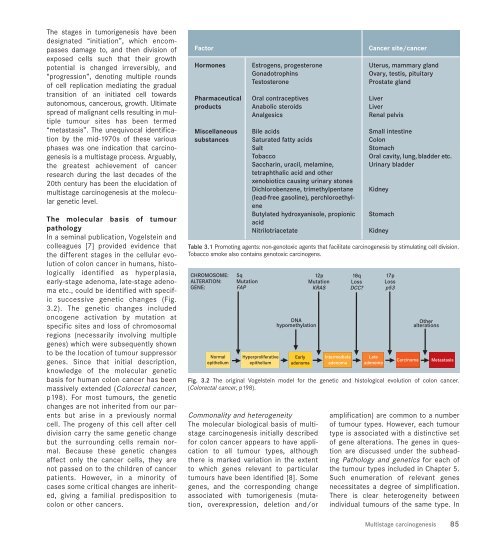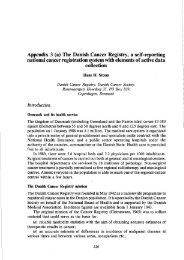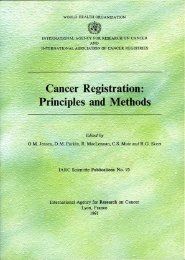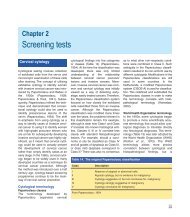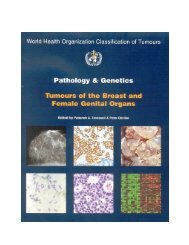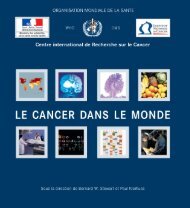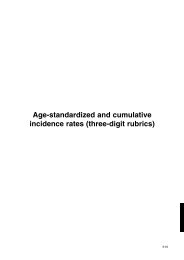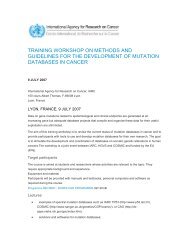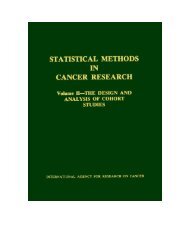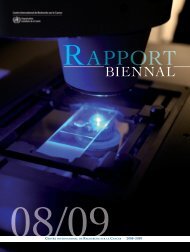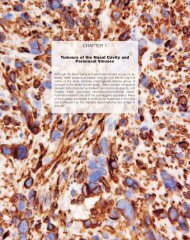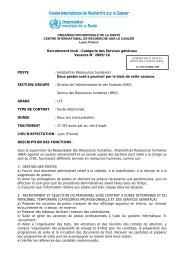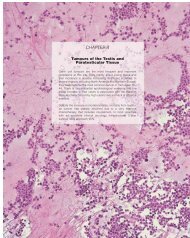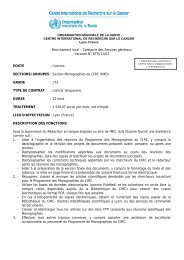world cancer report - iarc
world cancer report - iarc
world cancer report - iarc
You also want an ePaper? Increase the reach of your titles
YUMPU automatically turns print PDFs into web optimized ePapers that Google loves.
The stages in tumorigenesis have been<br />
designated “initiation”, which encompasses<br />
damage to, and then division of<br />
exposed cells such that their growth<br />
potential is changed irreversibly, and<br />
“progression”, denoting multiple rounds<br />
of cell replication mediating the gradual<br />
transition of an initiated cell towards<br />
autonomous, <strong>cancer</strong>ous, growth. Ultimate<br />
spread of malignant cells resulting in multiple<br />
tumour sites has been termed<br />
“metastasis”. The unequivocal identification<br />
by the mid-1970s of these various<br />
phases was one indication that carcinogenesis<br />
is a multistage process. Arguably,<br />
the greatest achievement of <strong>cancer</strong><br />
research during the last decades of the<br />
20th century has been the elucidation of<br />
multistage carcinogenesis at the molecular<br />
genetic level.<br />
The molecular basis of tumour<br />
pathology<br />
In a seminal publication, Vogelstein and<br />
colleagues [7] provided evidence that<br />
the different stages in the cellular evolution<br />
of colon <strong>cancer</strong> in humans, histologically<br />
identified as hyperplasia,<br />
early-stage adenoma, late-stage adenoma<br />
etc., could be identified with specific<br />
successive genetic changes (Fig.<br />
3.2). The genetic changes included<br />
oncogene activation by mutation at<br />
specific sites and loss of chromosomal<br />
regions (necessarily involving multiple<br />
genes) which were subsequently shown<br />
to be the location of tumour suppressor<br />
genes. Since that initial description,<br />
knowledge of the molecular genetic<br />
basis for human colon <strong>cancer</strong> has been<br />
massively extended (Colorectal <strong>cancer</strong>,<br />
p198). For most tumours, the genetic<br />
changes are not inherited from our parents<br />
but arise in a previously normal<br />
cell. The progeny of this cell after cell<br />
division carry the same genetic change<br />
but the surrounding cells remain normal.<br />
Because these genetic changes<br />
affect only the <strong>cancer</strong> cells, they are<br />
not passed on to the children of <strong>cancer</strong><br />
patients. However, in a minority of<br />
cases some critical changes are inherited,<br />
giving a familial predisposition to<br />
colon or other <strong>cancer</strong>s.<br />
Factor Cancer site/<strong>cancer</strong><br />
Hormones Estrogens, progesterone Uterus, mammary gland<br />
Gonadotrophins Ovary, testis, pituitary<br />
Testosterone Prostate gland<br />
Pharmaceutical Oral contraceptives Liver<br />
products Anabolic steroids Liver<br />
Analgesics Renal pelvis<br />
Miscellaneous Bile acids Small intestine<br />
substances Saturated fatty acids Colon<br />
Salt Stomach<br />
Tobacco Oral cavity, lung, bladder etc.<br />
Saccharin, uracil, melamine, Urinary bladder<br />
tetraphthalic acid and other<br />
xenobiotics causing urinary stones<br />
Dichlorobenzene, trimethylpentane Kidney<br />
(lead-free gasoline), perchloroethylene<br />
Butylated hydroxyanisole, propionic Stomach<br />
acid<br />
Nitrilotriacetate Kidney<br />
Table 3.1 Promoting agents: non-genotoxic agents that facilitate carcinogenesis by stimulating cell division.<br />
Tobacco smoke also contains genotoxic carcinogens.<br />
CHROMOSOME: 5q<br />
ALTERATION: Mutation<br />
GENE: FAP<br />
Normal<br />
epithelium<br />
Hyperproliferative<br />
epithelium<br />
DNA<br />
hypomethylation<br />
Early<br />
adenoma<br />
12p<br />
Mutation<br />
KRAS<br />
Fig. 3.2 The original Vogelstein model for the genetic and histological evolution of colon <strong>cancer</strong>.<br />
(Colorectal <strong>cancer</strong>, p198).<br />
Commonality and heterogeneity<br />
The molecular biological basis of multistage<br />
carcinogenesis initially described<br />
for colon <strong>cancer</strong> appears to have application<br />
to all tumour types, although<br />
there is marked variation in the extent<br />
to which genes relevant to particular<br />
tumours have been identified [8]. Some<br />
genes, and the corresponding change<br />
associated with tumorigenesis (mutation,<br />
overexpression, deletion and/or<br />
Intermediate<br />
adenoma<br />
18q<br />
Loss<br />
DCC?<br />
Late<br />
adenoma<br />
17p<br />
Loss<br />
p53<br />
Other<br />
alterations<br />
Carcinoma Metastasis<br />
amplification) are common to a number<br />
of tumour types. However, each tumour<br />
type is associated with a distinctive set<br />
of gene alterations. The genes in question<br />
are discussed under the subheading<br />
Pathology and genetics for each of<br />
the tumour types included in Chapter 5.<br />
Such enumeration of relevant genes<br />
necessitates a degree of simplification.<br />
There is clear heterogeneity between<br />
individual tumours of the same type. In<br />
Multistage carcinogenesis 85


